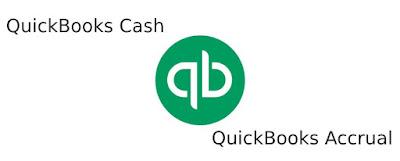When it comes to managing your business finances, there's no room for guesswork. You need a clear and accurate picture of your company's financial health, and that starts with choosing the right accounting method. Enter QuickBooks Cash vs Accrual – two powerful tools that can transform the way you track and analyze your financial data. But which one is right for your business? In this blog post, we'll dive deep into the world of QuickBooks Cash vs Accrual, exploring their features, pros and cons, and helping you make an informed decision on which method will unlock the full potential of your company's financial success! So let's get started on this exciting journey towards financial empowerment!

Comapring QuickBooks Cash vs Accrual
When it comes to managing your business finances, one of the key decisions you'll need to make is choosing between QuickBooks Cash vs QuickBooks Accrual. Both methods have their own unique features and benefits that can greatly impact how you track your income and expenses.
QuickBooks Cash is a method that focuses on cash inflows and outflows. It records transactions as they happen, making it ideal for businesses that want a real-time view of their cash flow. With this method, you'll be able to see exactly how much money you have at any given time, which can help with budgeting and decision-making.
On the other hand, QuickBooks Accrual takes into account revenue and expenses regardless of when cash actually changes hands. This method provides a more comprehensive view of your financials by recognizing revenue when it's earned and expenses when they're incurred. This makes it particularly useful for businesses that offer credit terms or rely on accrual-based reporting.
Both methods have their pros and cons. With QuickBooks Cash, you get simplicity and real-time visibility into your cash flow. It's easy to understand and requires less bookkeeping knowledge. However, its drawback lies in its limited reporting capabilities compared to accrual accounting.
QuickBooks Accrual offers more detailed reporting options since it captures revenue/expenses regardless of payment timing. This allows for accurate performance tracking over longer periods. However, accrual accounting may require more expertise in understanding complex concepts like accounts receivable/payable or prepaid expenses.
Choosing between QuickBooks Cash vs Accrual depends on factors like your business model, industry requirements, and long-term goals.
If real-time insight into available funds is crucial - especially if you deal mostly with cash transactions - then QuickBooks Cash might be the better fit.
However if precise financial analysis across different periods & payment timings matters most – especially if invoicing or dealing with credit terms-then consider opting for Quickbooks Accrual.
Understanding the differences between QuickBooks Cash and Accrul can help you make a more informed decision about how to manage your business finances.
What Is QuickBooks Cash ?
What is QuickBooks Cash? If you're a small business owner, chances are you've heard of QuickBooks. It's a popular accounting software that helps streamline your financial management processes. One of the key features of QuickBooks is the ability to track your business transactions either using the cash basis or accrual basis method.
QuickBooks Cash is essentially the cash basis method in action. This means that it records transactions when money actually changes hands. For example, if you receive payment from a customer today, QuickBooks Cash will immediately record it as income.
Using QuickBooks Cash can be beneficial for businesses that primarily deal with cash transactions or have simple finances. It provides real-time visibility into your available cash and allows for easier tracking of income and expenses without having to account for credit sales or unpaid invoices.
However, there are some limitations to consider with QuickBooks Cash. Since it only tracks cash transactions, it may not provide an accurate picture of your overall financial health if you have outstanding invoices or bills yet to be paid.
In addition, using the cash basis method might not comply with Generally Accepted Accounting Principles (GAAP) required by some lenders or investors who prefer accrual-based statements for more accurate reporting.
QuickBooks Cash can be a useful tool for small businesses looking for simplicity and real-time visibility into their available funds. However, before making a decision on which accounting method to use, it's important to weigh the pros and cons based on your industry requirements and future growth plans.
What Is QuickBooks Accrual ?
QuickBooks Accrual is an accounting method that records income and expenses when they are earned or incurred, regardless of when the cash actually changes hands. In other words, it focuses on tracking transactions based on the time they occur rather than when the money is received or paid.
With QuickBooks Accrual, you can accurately match revenue with expenses, providing a more comprehensive view of your business's financial health. It allows you to see a true representation of your company's profitability over a specific period of time.
By using this method, you can gain valuable insights into your business operations and make informed decisions about pricing strategies, inventory management, and overall financial planning. It provides a clearer picture of how your business is performing and helps you project future growth.
However, it's important to note that QuickBooks Accrual requires careful monitoring and reconciliation since it involves keeping track of unpaid invoices, outstanding bills, and other pending transactions. This may require additional effort in terms of bookkeeping tasks but can be beneficial for businesses that want a more accurate portrayal of their financial standing.
QuickBooks Accrual offers greater accuracy in reporting financial data but may involve more complex record-keeping compared to the Cash method. It's essential to understand the specific needs and goals of your business before choosing which accounting method - Cash or Accrual - best suits your requirements.
What Are The Pros And Cons Of QuickBooks Cash vs Accrual ?
When it comes to managing your business finances, choosing between QuickBooks Cash vs Accrual can have a significant impact. Each method has its own set of pros and cons that you need to consider before making a decision.
Let's start with the benefits of using QuickBooks Cash. One advantage is simplicity. With cash accounting, you record transactions when money physically changes hands. This means that you don't have to worry about tracking accounts receivable or payable. It's straightforward and easy to understand.
Another benefit is cash flow management. By focusing on actual cash inflows and outflows, you can gain a clear picture of your current financial situation at any given time. This can be particularly useful for small businesses with limited resources who need real-time visibility into their available funds.
However, there are also some drawbacks to using QuickBooks Cash. Because it only tracks actual cash movements, it may not give you an accurate representation of your overall financial health in the long term. For example, if you make a sale on credit but haven't received payment yet, it won't be reflected in your cash-based records.
On the other hand, let's delve into the advantages of utilizing QuickBooks Accrual accounting for your business needs. One major benefit is accuracy in matching revenue and expenses within specific periods regardless of when payments are made or received.
Accrual accounting allows for better forecasting as it provides insights into future income and expenses based on commitments made by customers or suppliers even before they occur tangibly in terms of money movement.
However, one drawback is complexity since accrual accounting requires more detailed tracking of accounts receivable and payable along with adjusting entries at month-end or year-end closings which might increase administrative workloads especially for smaller businesses without dedicated finance teams.
Note, deciding between QuickBooks Cash versus Accrual depends on various factors such as the size and nature of your business, financial goals, reporting requirements, and personal preference. Understanding the pros and cons of each option will help you make an informed decision that best suits your business needs.
Which Is Right for Your Business?
When it comes to choosing between QuickBooks Cash and Accrual, the right option for your business depends on various factors. Let's explore some considerations to help you make an informed decision.
Consider the nature of your business operations. If you primarily deal with cash transactions and have a straightforward revenue stream, QuickBooks Cash might be the best fit. It allows you to track income and expenses as they happen, making it easier to manage your cash flow in real-time.
On the other hand, if your business involves credit sales or purchases that extend beyond immediate payment, QuickBooks Accrual may be more suitable. This method helps you accurately record revenue and expenses even before cash exchanges hands by recognizing them when they are earned or incurred.
Another factor to consider is how detailed financial reporting matters to your business. If you require comprehensive reports that reflect both monetary transactions and outstanding obligations accurately, Accrual accounting provides a clearer picture of your overall financial health.
However, if simplicity is key for managing finances without delving into complex calculations or analyzing pending payments/receipts thoroughly, Cash accounting offers a streamlined approach.
Additionally, take into account any legal requirements specific to your industry or jurisdiction. Some businesses may be required by law to utilize either Cash or Accrual accounting methods based on their size or type of activity conducted.
The choice between QuickBooks Cash and Accrual boils down to what aligns best with your unique needs and preferences as a business owner. Consider assessing factors such as transaction volume, complexity of operations, reporting requirements, and legal obligations before making a decision.
Remember that there isn't one-size-fits-all solution – what works for another company may not work for yours. So take the time to evaluate which method suits your specific circumstances best!
By understanding these differences between QuickBooks Cash vs Accrual accounting methods, you can confidently choose which option will empower you to manage your business finances more effectively.
Conclusion
In this article, we have explored the power of QuickBooks Cash vs Accrual and discussed their key differences. QuickBooks Cash is a simple and straightforward method that records transactions when money is received or spent. On the other hand, QuickBooks Accrual tracks income and expenses when they are earned or incurred.
Each method has its pros and cons. With QuickBooks Cash, you get real-time visibility into your cash flow and it's easier to understand for small businesses with simpler financial needs. However, it may not provide an accurate picture of your business's overall profitability.
QuickBooks Accrual offers a more comprehensive view of your finances by matching income and expenses to the period in which they are earned or incurred. This allows for better tracking of long-term trends and helps you make informed decisions about your business's future.
The choice between QuickBooks Cash vs Accrual depends on the nature of your business, its size, complexity, industry norms, reporting requirements, and personal preference. It is advisable to consult with an accountant or bookkeeper who can guide you based on these factors.
Remember that regardless of which method you choose initially, it is possible to switch between them within QuickBooks if your business needs change over time.
Unlocking the power of QuickBooks Cash vs Accrual will help ensure accurate record-keeping and financial management for your business. By understanding these methods thoroughly and selecting one that aligns with your unique circumstances, you'll be equipped to make sound financial decisions that drive success.
So take some time to evaluate what works best for your specific situation! Whether you opt for simplicity with cash basis accounting or prefer a more detailed approach with accrual basis accounting – as long as you're aware of each method's advantages and drawbacks – there's no doubt that using either one effectively can greatly benefit your bottom line!

